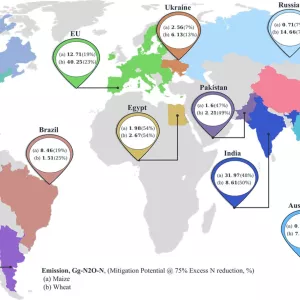Mapping the way to lower nitrous oxide emissions
Like many issues besetting contemporary agri-food systems, the question of nitrogen use appears to yield contradictory problems and solutions depending on where you look. Many parts of the globe are experiencing the environmental consequences of excessive and inefficient use of nitrogen fertilizers. Elsewhere nitrogen-poor soils are a hindrance to agricultural productivity. Maize and wheat agri-food systems are at the heart

Mapping the way to lower nitrous oxide emissions
Like many issues besetting contemporary agri-food systems, the question of nitrogen use appears to yield contradictory problems and solutions depending on where you look. Many parts of the globe are experiencing the environmental consequences of excessive and inefficient use of nitrogen fertilizers. Elsewhere nitrogen-poor soils are a hindrance to agricultural productivity.
Maize and wheat agri-food systems are at the heart of this dilemma. These staple crops are critical to ensuring the food security of a growing population. They also account for around 35% of global nitrogen fertilizer usage. Tackling the problem first requires an accurate accounting of global N20 emissions from maize and wheat fields, followed by quantification of mitigation potential disaggregated by region.
This is the task undertaken by a recent study published in Science of the Total Environment and co-authored by a team of researchers including scientists at the International Maize and Wheat Improvement Center (CIMMYT) and the CGIAR Research Program on Climate Change, Agriculture and Food Security (CCAFS).

